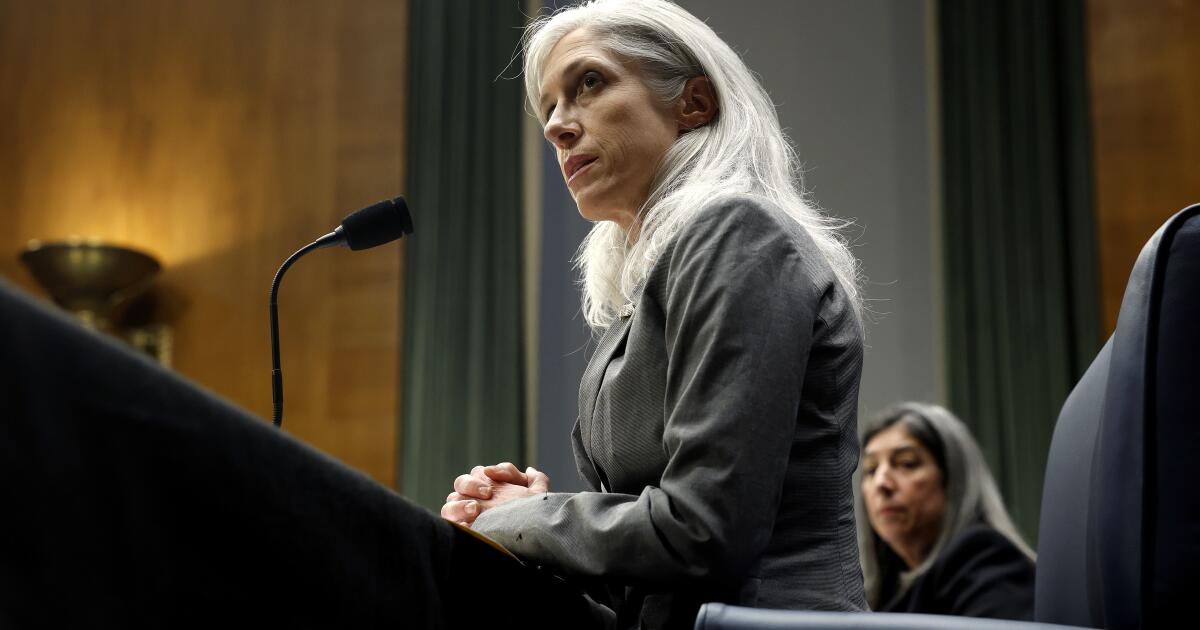Newsom taps former CDC leaders critical of Trump-era health policies
SACRAMENTO — Gov. Gavin Newsom on Monday announced a new California-led public health initiative, tapping former U.S. Centers for Disease Control and Prevention officials who publicly clashed with the Trump administration, including the former agency chief who warned that the nation’s public health system was headed to “a very dangerous place.”
Newsom said the initiative will be led by Dr. Susan Monarez, the former CDC director, and Dr. Debra Houry, the CDC’s former chief medical officer. The pair will lead the Public Health Network Innovation Exchange, or PHNIX, which the governor’s office said will “modernize public health infrastructure and maintain trust in science-driven decision-making.”
The initiative was created to improve the systems that detect and investigate public health trends and build a modern public-health backbone that connects data, technology and funding across states.
“The Public Health Network Innovation Exchange is expected to bring together the best science, the best tools, and the best minds to advance public health,” Newsom said in a statement Monday. “By bringing on expert scientific leaders to partner in this launch, we’re strengthening collaboration and laying the groundwork for a modern public health infrastructure that will offer trust and stability in scientific data not just across California, but nationally and globally.”
Monarez will serve as strategic health technology and funding advisor for the initiative, helping advance private sector partnerships to better integrate healthcare data systems and enable faster disease surveillance.
“I am deeply excited to bring my experience in health technology and innovation to support PHNIX,” Monarez said in a statement shared by Newsom’s office. “California has an extraordinary concentration of talent, technology, and investment, and this effort is about putting those strengths to work for the public good — modernizing how public health operates, accelerating innovation, and building a healthier, more resilient future for all Californians.”
Houry was named senior regional and global public health medical advisor for PHNIX. Newsom’s office also announced it will work with Dr. Katelyn Jetelina, founder and chief executive of Your Local Epidemiologist. Jetelina will advise the California Department of Public Health on building trust in public health.
Monarez and Houry both described extraordinary turmoil inside the nation’s health agencies during congressional hearings, telling senators in September that Health and Human Services Secretary Robert F. Kennedy Jr. and political advisors rebuffed data supporting the safety and efficacy of vaccines. Monarez was fired after just 29 days on the job. She said Kennedy told her to resign if she did not sign off on new unsupported vaccine recommendations. Kennedy has described Monarez as admitting to him that she is “untrustworthy,” a claim Monarez has denied through her attorney.
“Dramatic and unfounded changes in federal policy, funding, and scientific practice have created uncertainty and instability in public health and health care,” Dr. Erica Pan, CDPH director and state public health officer, said in a statement. “I am thrilled to work with these advisors to catalyze our efforts to lead a sustainable future for public health. California is stepping up to coordinate and build the scaffolding we need to navigate this moment.”
The salaries of the new positions were not immediately known.
Newsom’s office said the California initiative would build on previously announced public health partnerships, such as the West Coast Health Alliance.
